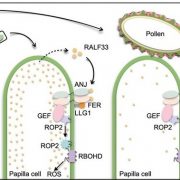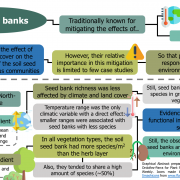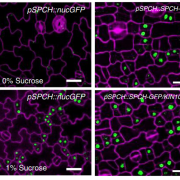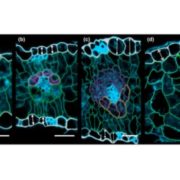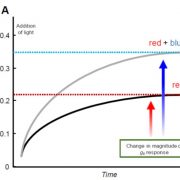Evolution of chloroplast retrograde signaling facilitates green plant adaptation to land (PNAS)
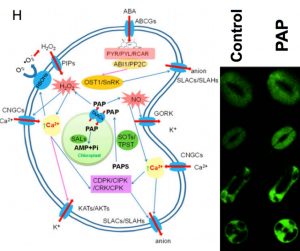 The evolution of signaling pathways in plants enabled the water to land transition, during which drought response was crucial for the adaptation to terrestrial habitats. Here, Zhao et al. reveal the role of drought- induced phosphoadenosine (PAP) in the regulation of abscisic acid (ABA) synthesis in the chloroplasts, which leads to stomatal closure. Also, they found PAP is mediated by the nucleotide phosphatase SAL1. The authors postulate “PAP-induced stomatal closure, guard-cell ROS and NO signaling, and ion transport” are evolutionarily conserved, by using stomatal bioassays, fluorescent indicators, bioinformatics and comparative genetic similarity analysis comparing 31 species including land plants, streptophyte and chlorophyte algae. Furthermore, this study suggests SAL-PAP retrograde signaling pathway and ABA signaling evolved in streptophytes prior to stomata formation in the process of terrestrialization. This work provides insights into the evolution of signaling pathways which leads to crops capable to adapt to water scarcity conditions. (Summary by Ana Valladares) PNAS 10.1073/pnas.1812092116
The evolution of signaling pathways in plants enabled the water to land transition, during which drought response was crucial for the adaptation to terrestrial habitats. Here, Zhao et al. reveal the role of drought- induced phosphoadenosine (PAP) in the regulation of abscisic acid (ABA) synthesis in the chloroplasts, which leads to stomatal closure. Also, they found PAP is mediated by the nucleotide phosphatase SAL1. The authors postulate “PAP-induced stomatal closure, guard-cell ROS and NO signaling, and ion transport” are evolutionarily conserved, by using stomatal bioassays, fluorescent indicators, bioinformatics and comparative genetic similarity analysis comparing 31 species including land plants, streptophyte and chlorophyte algae. Furthermore, this study suggests SAL-PAP retrograde signaling pathway and ABA signaling evolved in streptophytes prior to stomata formation in the process of terrestrialization. This work provides insights into the evolution of signaling pathways which leads to crops capable to adapt to water scarcity conditions. (Summary by Ana Valladares) PNAS 10.1073/pnas.1812092116



